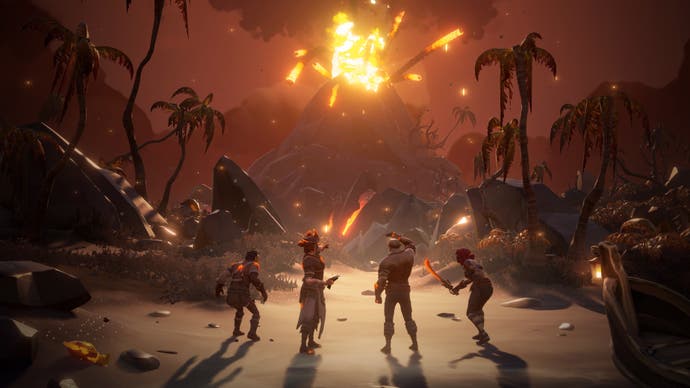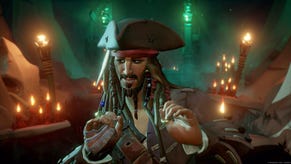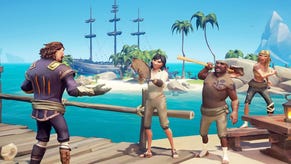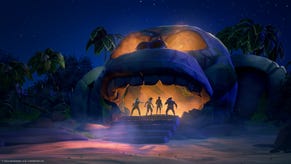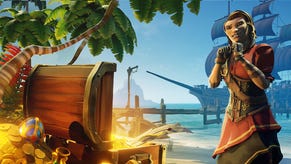Rare talks Sea of Thieves' first six months, and what's next
As its third expansion, Forsaken Shores, arrives.
Today sees the release of Forsaken Shores, Sea of Thieves' most ambitious content expansion yet. Not only does it add an entirely new, extra-challenging, area of the world to explore, alongside rowboats and more, it marks six months of post-launch updates for Sea of Thieves since the game's arrival on Xbox One and PC in March.
To celebrate the occasion, Eurogamer chatted with Sea of Thieves' executive producer Joe Neate about the multiplayer pirate adventure's launch, the community's influence on the game's continued evolution, and a little on where future updates may lead curious seafarers.
Sea of Thieves was, and has remained, a divisive experience. While many embraced the freeform adventuring and slapstick buccaneering that Rare's ambitious multiplayer game afforded from launch, others have stayed resolute in their disdain for the game's perceived lack of traditional "content" and progress goals.
Sea of Thieves' release, says Neate, was an "interesting time" for the studio. "By every available metric to us, we were a breakout success. We beat every single internal target we had - whether that was sales or Game Pass, or the amount of hours viewed [on Twitch, YouTube, and Mixer] - and then you were in this place where you did have mixed sentiment around stuff, because it was one of those big talking points for people."

Part of Sea of Thieves' divisive nature, suggests Neate, comes down to the fact that Rare made some "bold decisions" with its design and systems, "Because it's so unique, because it's so different, and we're trying lots of new things, I think we're always going to get that [division of opinion]." However, Neate says the studio "always believed we could make a different type of multiplayer game, something that would be fun and welcoming and allow people to play together when maybe in other games they can't because they joined late and feel left behind".
And although opinion has remained divided, Rare's vindication, as Neate sees it, lies in the fact that "the community that's playing Sea of Thieves now has embraced it for what it is, this role-playing kind of sandbox multiplayer pirate game". Keep an eye on the internet and "you'll see stories of families playing together, and of husbands and wives and partners playing together that maybe don't normally play games, or families spread across the world coming in and... experiencing this great adventure".
"Broadly," says Neate, "I think the premise of what Sea of Thieves is and what's unique about it landed really well, but for some people, they were like, 'Hey this is cool but give us more, we want to see more things things in the world, we want to be seeing more stuff.'"
As Rare made clear from the start, its plan has always been to grow and evolve the experience post-launch, "and we were always going to do that with players playing it", says Neate. "You can only learn so much from closed beta, or an Insider Programme kind of environment, and when you bring in paying players, of all different levels of awareness of what our vision for [the game] is, you're going to get loads of different opinions and feedback."
Indeed, as a direct result of feedback following Sea of Thieves' launch, Rare's initial plans - to bring in pets and ship ownership as the game's first major update - changed dramatically. "We talked openly about wanting to bring in pets," says Neate, "about wanting to do a kind of cool, fun, social thing there, but it just didn't feel like the right time to do them. It felt like there were more pressing needs for us to go and tackle."
To that end, the team "locked ourselves in a room for a couple of weeks... and really just kind of thrashed through all the feedback, and went, 'How do we want to reflect this in our plans moving forward?'. So we updated the road map, we updated our plans, we actually changed the team structure in terms of how we can work to deliver this."
Sea of Thieves' newly-revised content road map was unveiled in April, revealing three named, large-scale content expansions of increasing complexity - The Hungering Deep, which launched in May, Cursed Sails, which arrived in July, and today's Forsaken Shores update.
As Neate explains, Rare's post-launch discussions lead the studio to settle on three key areas that it wanted to hit with each new update: new ways to play, such as "new ships, new quest types or strengthening the existing trading companies", new goals and rewards, and what Neate calls "the journey". This, he says, "is what probably makes Sea of Thieves most unique and most special, those things which enrich the journey, like the speaking trumpet, like the rowboat, like the skeleton ships, like the megalodon, all of these things which will make each journey richer, and more interesting, and more dynamic."
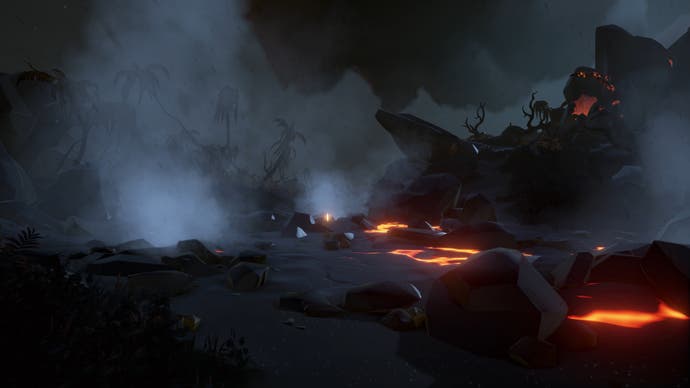
With those elements in mind, The Hungering Deep, Rare's first significant expansion of the core game, saw an initial attempt to incorporate a narrative-driven quest to the experience (starring the much-missed pirate Merrick), and featured an AI-controlled megalodon as its centrepiece - what Neate calls “a cool new emergent threat that would really just liven up any journey and adventure”.
More significantly, however, The Hungering Deep marked Rare's first real stab at influencing the psychology of the game. Post-launch, Sea of Thieves was a sometimes exhaustingly competitive experience, thanks to its overwhelming focus on PvP. However, Rare was keen to see if it could "drive different player and social dynamics by bringing in a goal that pulls people together". The end result was a boss battle, the megalodon, that could only be initiated if two crews lowered weapons and agreed joined forces.
And the effects were more profound than Rare had imagined. "We saw that player encounters, ship encounters, that ended in battle dropped in half during The Hungering Deep," says Neate, "and it literally made Sea of Thieves fifty per cent more friendly. That was a really interesting thing to learn, that we could drive behaviour while introducing cool new features that we liked."
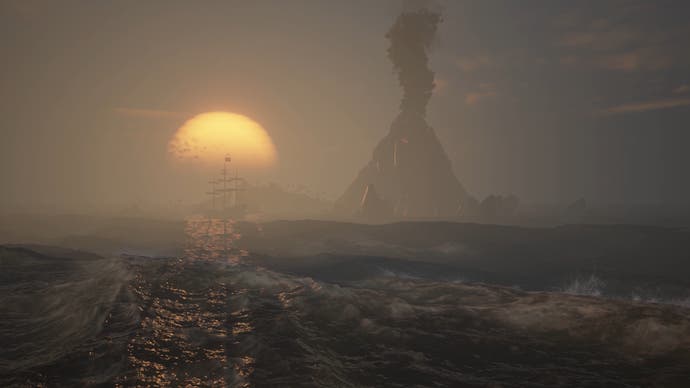
Rare's next update, Cursed Sails, meanwhile, was notable for the fact it saw Rare reneging on one of the core principles it had doggedly stuck with early on in Sea of Thieves' development. "We were always very passionate about the fact that the only sail you'll ever see will be another player", says Neate, "That was a line we used for many, many interviews - and we pushed back on our initial community, saying we don't want to do AI ships".
However, that changed once the game launched and Rare began to better understand its player base and how the game was evolving. Although Sea of Thieves' naval combat is often raucously entertaining, Rare acknowledged that not everyone was a keen PvPer. Unfortunately, says Neate, "people who don't want to be involved in combat [were] on the raw end of it, and so we wanted to introduce skeleton ships so that they could experience the cool combat that everyone loves, and on demand, whilst not always affecting other players". That in turn afforded the studio more opportunities to expand on the successes of the inter-crew adventuring it introduced in The Hungering Deep via the new Alliance system.
As a result of Cursed Sails' efforts, "You'll see people making friends out on the sea, you'll see some people not making friends too... and as we've been constantly adding things to that sandbox, as we've moved forward, the stories keep getting richer."
All of which leads to Forsaken Shores, the most significant expansion for Sea of Thieves yet. With the game now able to support a healthy balance of player interactions and drive a richer variety of player-made stories, Neate says it is "the right time to introduce a completely new region to the world that plays very, very differently, that's a more challenging kind of opt-in experience". And thus the Devil's Shroud has now parted around the edge of the game's existing map to offer access to the Devil's Roar, a deadly volcanic biome designed to ramp up the peril and white-knuckle adventure.

"If you think about those categories I described before," says Neate, "there's new ways to play with cargo runs coming in, the journey is the new part of the world, the rowboats, even the little sea posts are part of the journey... so we're always trying to fill in as many gaps in ways to play and goals and stuff on that road map as we move forward."
As for the future, Neate won't be drawn on specifics just yet: "It's been a very exciting six months in terms of what we've released," he says, "We've delivered some awesome updates and Forsaken Shores adds to that, but we're learning a lot too, and we're just figuring out how we talk about what comes next, and how much we go into the future. I want to take a deep breath with Forsaken Shores releasing - it's been pretty intense".
However, Neate does offer a bit of a tease, suggesting that one of Rare's current goals is to accommodate those players that prefer something a little more structured over the current freeform, sandbox-style experience: "Some people, we know, really want more guided goals, stuff with a bit more lore, a bit more story, a bit more direction that you can come in and play, but that still retains the magic of this shared world and all those great emergent encounters".
All of those, he says, are "a big thing that we want to do in the future. I can't say when because it's a lot of work, a lot of stuff to do there but, you know, I think that kind of stuff is going to be a really impactful, really different thing for Sea of Thieves, that plays on everything that's great about it but brings something very new". There is, says Neate, "a lot of excitement about some of the work that's going on in the studio around that".
"We know that there are a lot of players that maybe played Sea of Thieves at the start and it wasn't quite for them yet," explains Neate, "we know that there's a lot more people that can come in and experience what's magic about it... We want players in this shared world together, having awesome pirate stories... embracing the creativity and the freedom that they have". The future, Neate concludes, will be about "giving different people reasons to come and play."
